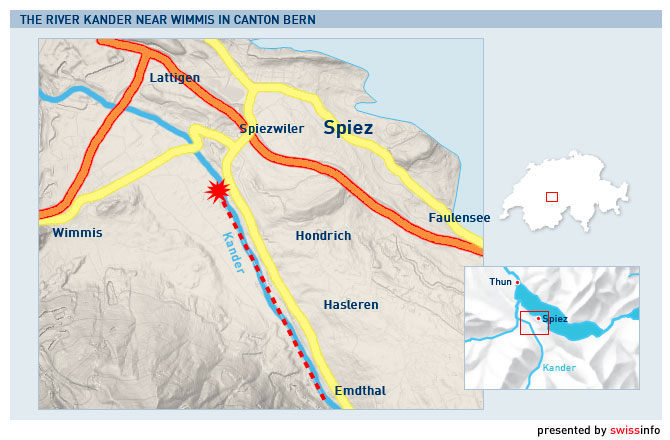
Kander river rafting trial begins

A Swiss army officer charged with multiple involuntary manslaughter in relation to the 2008 River Kander deaths has appeared before a military tribunal.
Five soldiers lost their lives when two rubber boats capsized on the river in the Bernese Oberland on June 12, 2008. The commanding officer and four others survived. One victim’s body has never been found.
The military investigation into the fatal rafting accident found that the trip was poorly planned and that the troops involved, all ten from an airfield security unit, were inexperienced.
The report said that no detailed reconnaissance of the river had apparently been carried out beforehand, and that no provision had been made for any rescue service to be on stand-by.
The unnamed officer who organised the trip suffered a broken jaw in the accident. He is also answering charges of bodily injury caused by negligence, and misuse and the destruction of equipment. The court sits in the Bernese town of Thun.
Prison term?
Silvia Schenker, spokeswoman for the military justice authorities, told swissinfo.ch that the penalty for involuntary manslaughter under military penal law was up to three years in prison or a fine. The court is expected to deliver its judgement by the evening of October 21.
“There are no special military prisons; sentences handed down by military courts are enforced by the relevant canton,” Schenker said. The court in Thun is presided over by a panel of five military judges.
The military investigation found no evidence to prosecute any more senior members of the army chain of command, according to Schenker.
However shortly after the Kander tragedy, the commander of Switzerland’s air force Walter Knutti was forced to resign.
Although the request for his resignation was not directly linked to the accident on the River Kander, investigation into the Kander case revealed that Knutti had forwarded promotion applications for officers without reviewing the files of the applicants.
Two weeks prior to the fatal rafting expedition Knutti rubber-stamped a promotion of the officer who would organise the trip, although the candidate had not reached the minimum age of 30 years.
Fateful day
The definitive decision to make the trip was taken only on the morning of June 12, the day of the accident.
The alarm was raised around 11.30am. Two rubber dinghies overturned on the river, which was flowing at 40 cubic metres per second – a rate that is considered unexceptional.
There were no storms in the area either that could have increased the flow, according to the Swiss national weather service, Meteoswiss.
However, locals told swissinfo.ch at the time that water levels were high and that the stretch of river where the accident took place was graded as highly difficult for rafting. Commercial rafting was effectively banned there, according to Swiss radio reports at the time of the accident.
“Something to do”
The accident, which came less than a year after six recruits died in an avalanche on the Jungfrau, reignited the debate on the precise role of Switzerland’s militia army, which every able-bodied man must join. The defence ministry receives an annual budget of SFr4.5 billion ($4.3 billion).
In the aftermath of the Kander accident, the Geneva-based newspaper Le Temps said many officers admitted that there was a serious problem in the Swiss army with soldiers not having enough to do.
All sorts of unauthorised exercises were undertaken “to kill time”.
The Swiss pacifist organisation Group for a Switzerland without an Army (GSoA) is a long-standing critic of the army. It campaigns for the abolition of the Swiss army and the re-distribution of the saved expenses to domestic and international civilian conflict resolution initiatives.
“When you look at the activities the army undertakes, such as helping out at sporting events, you can see that they are desperate for something to do,” Adrian Seller of GSoA told swissinfo.ch.
“Times have changed, but the army hasn’t,” he added.
During the Cold War the Swiss army numbered 600,000 men who could be called up at short notice.
In 1995 the army was reduced to 400,000 and today is around 220,000. Some 20,000 new recruits begin training every year.
Able-bodied men between the ages of 20 and 36 must serve 260 days of military service. Military service is optional for women and Swiss living abroad.
The 10 soldiers involved in the Kander accident had completed their initial basic military training and were taking part in an annual compulsory three-week refresher course.
The security specialists were based in Wimmis for their course, but they were normally attached to the Alpnach airfield in central Switzerland.
The rafting trip, designed to strengthen morale, had not been included in the company’s daily or weekly agenda.
In the accident two rubber dinghies capsized while attempting to cross the weirs on the river between Wimmis and Lake Thun. Five men, aged 25 to 33, were drowned while the remaining five – including the company commander – were injured.
The survivors, who were all interviewed in the framework of the official investigation, made contradictory statements about whether they had been ordered to take part or whether the exercise was voluntary. However, the investigation established that it had taken place during the hours when they were on duty.
None of the survivors had had any civilian training in river rafting. The commander who organised the fatal trip said he had received training in handling the type of army dinghy used.


In compliance with the JTI standards
More: SWI swissinfo.ch certified by the Journalism Trust Initiative



























You can find an overview of ongoing debates with our journalists here . Please join us!
If you want to start a conversation about a topic raised in this article or want to report factual errors, email us at english@swissinfo.ch.